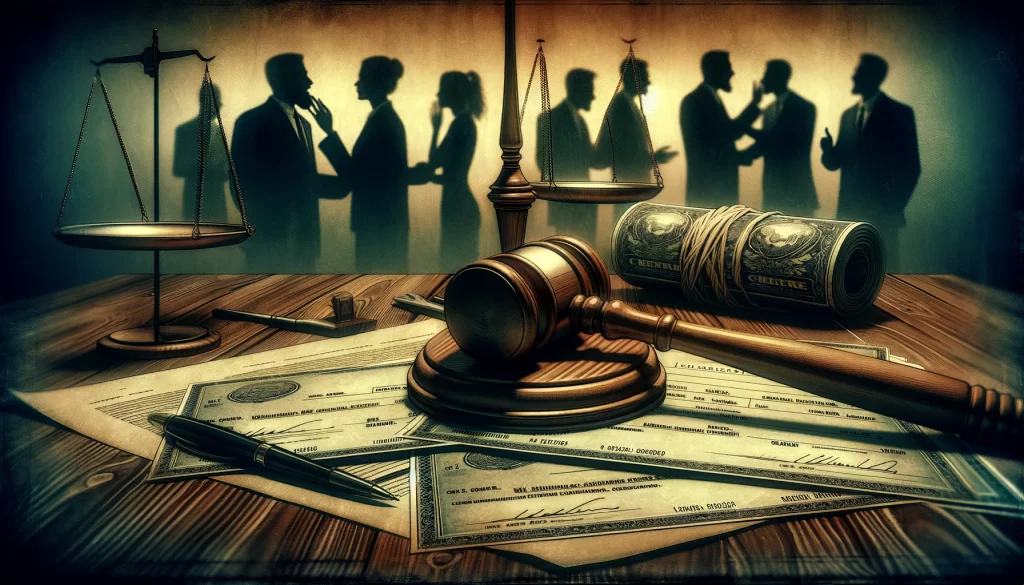In the fourth week of Donald Trump’s criminal trial in Manhattan, the proceedings ranged from sexually sensational testimonies to more routine evidential presentations. The week concluded with a significant development—the announcement that Michael D. Cohen, once a close associate of Trump, would testify the following week.
Justice Juan M. Merchan presided over the trial and had to step in regarding Cohen’s public comments about Trump. After a defense lawyer highlighted a TikTok video where Cohen appeared wearing a shirt depicting Trump behind bars, Justice Merchan requested that prosecutors advise Cohen to refrain from making public comments about the case.
The trial has captured public attention partly due to the involvement of Stormy Daniels, a porn actress who testified about her alleged 2006 sexual encounter with Trump. Her detailed account lasted almost eight hours, providing insights into the interactions in a hotel suite in Lake Tahoe, Nevada. Her testimony included not only the details of the encounter but also her mixed feelings before and after the event.
During her testimony, which initially included some digressions, Justice Merchan had to remind her to stay on topic, leading to multiple objections from the defense that were sustained. However, under cross-examination by Susan Necheles, one of Trump’s lawyers, Daniels became more concise and defended her testimony vigorously against suggestions that she fabricated her story or was motivated by financial gain.
Daniels’s testimony directly contradicted Trump’s denials of the encounter. She continued to challenge Trump publicly, suggesting on social media that “real men” would testify in court.

The issue at the heart of the trial is a $130,000 payment to Daniels just before the 2016 presidential election, which prosecutors allege was intended to prevent her from publicizing her story. Trump, 77, faces charges of falsifying business records related to this payment. He has denied both the affair and the allegations, stating that the charges are unfounded. If convicted, he could face a range of penalties from probation to imprisonment.
Apart from the testimonies, the trial has also included substantial discussions about financial documents. Testimonies from employees of the Trump Organization and others provided a detailed look into the process of how Trump’s repayment checks to Cohen were handled—approved, cut, mailed, signed, and returned. This paper trail is crucial for the prosecution’s case, as it seeks to prove that Trump was personally involved in the concealment of the payments.
The trial has also revisited some of Trump’s past writings, where he described himself as a meticulous overseer of his business affairs, suggesting a tendency to micromanage. The prosecution has used these statements to support their case that Trump was likely aware of the financial arrangements with Daniels.
Trump’s behavior in court has also been notable. At one point, he reacted audibly during Daniels’s testimony, which led to a private rebuke from Justice Merchan about possible intimidation. His demeanor—sometimes closing his eyes, which he claims helps him focus—might also impact how the jury perceives his reactions to the proceedings.
The forthcoming testimony from Michael Cohen, scheduled for Monday, is highly anticipated. Given the history between Cohen and Trump, where Cohen has shifted from a close legal aide to a critical witness for the prosecution, his testimony is expected to be pivotal. The defense has already indicated that they viewCohen as a problematic witness, which suggests that his appearance could lead to significant courtroom dynamics.
The prosecution hinted that they might rest their case by the end of the upcoming week.
This article is based on the following article:

Background Information
By understanding these background elements, readers can better grasp the complexities and significance of the trial and the events described in the article.
1. Who is Donald J. Trump?
Donald J. Trump is a prominent American figure known primarily for being the 45th President of the United States, serving from January 2017 to January 2021. Before his presidency, Trump was well-known as a businessman, real estate developer, and television personality, notably appearing on the reality TV show “The Apprentice.”
2. What is the role of a criminal trial?
A criminal trial is a legal process used to determine whether someone is guilty of a crime. In the United States, trials are usually public events where evidence is presented before a judge and often a jury. The jury listens to the evidence and decides if the defendant (the person accused of a crime) is guilty or not based on the evidence presented.
3. Importance of the Charges
In this trial, Donald Trump is accused of falsifying business records. This charge can seem minor but is serious because it pertains to allegations that he tried to hide a payment to prevent damaging information from affecting his presidential campaign. Falsifying business records can involve altering, concealing, or destroying documents to deceive others or for personal gain.
4. Who is Stormy Daniels?
Stormy Daniels, whose real name is Stephanie Clifford, is an adult film actress and director. She is a central figure in this case because the charges against Trump involve a payment made to her. Daniels claims that this payment was intended to prevent her from discussing an alleged sexual encounter she had with Trump in 2006, which Trump denies.
5. What is a gag order?
In legal contexts, a gag order is a ruling that restricts the information that the parties involved in a lawsuit can disclose to third parties or the public. It aims to ensure a fair trial by preventing media coverage from influencing the jury or public opinion. Trump has been accused of violating such an order.
6. Who is Michael Cohen?
Michael Cohen is a lawyer who previously worked for Donald Trump as his personal attorney and fixer. A fixer is someone who is tasked with handling complicated or troublesome issues discreetly. Cohen has become a key witness in this trial, especially interesting because he has turned from a loyal aide to Trump into a critic and adversary, ready to testify against him.
7. Understanding Testimonies and Evidence
In a trial, testimonies from witnesses and the submission of evidence are crucial for proving whether the defendant committed the crime. Witness credibility and the reliability of evidence can significantly impact the trial’s outcome.
8. Impact of Public Statements and Social Media
The interaction of legal processes with public statements and social media is particularly relevant in this trial. Comments made by Cohen on platforms like TikTok, as well as statements by other key figures like Stormy Daniels, play a role in shaping public perception and can complicate legal proceedings.
9. The Significance of the Trial’s Outcome
The outcome of this trial has broader implications beyond just the legal consequences for Trump. It affects his public image, potential future political aspirations, and the broader political landscape in the United States.
Please subscribe to Insight Fortnight, our biweekly newsletter!
